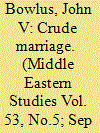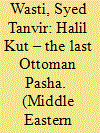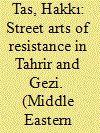|
|
|
Sort Order |
|
|
|
Items / Page
|
|
|
|
|
|
|
| Srl | Item |
| 1 |
ID:
153590


|
|
|
|
|
| Summary/Abstract |
Since the discovery of oil at Kirkuk in northern Iraq, oil has shaped relations between Iraq and Turkey, as the former needed markets and export routes to the Mediterranean and the latter reliable sources of supply. This article examines the origins of the Kirkuk–Ceyhan oil pipeline from northern Iraq to the Turkish Mediterranean coast, charting the period of Iraqi–Turkish economic rapprochement in the 1960s to the construction of the pipeline in the 1970s. It also seeks to add to our collective understanding of why transnational oil pipelines in the Middle East succeed or fail by examining the pipeline's operational record.
|
|
|
|
|
|
|
|
|
|
|
|
|
|
|
|
| 2 |
ID:
153595


|
|
|
|
|
| Summary/Abstract |
The siege of British Indian forces by the Ottoman Army at Kut-al-Amara ın Iraq during the First World War, which ended on 29 April 1916 with the surrender of the garrison under the command of Major General Sir Charles Townshend, was an important mılıtary defeat for Great Britain. The article provides supplementary information on aspects of the 147 day long siege and surrender, based mainly on the memoirs of the Turkish General H. K. Pasha, whose forces took well over 10,000 British Indian officers and men into custody at Kut-al-Amara.
|
|
|
|
|
|
|
|
|
|
|
|
|
|
|
|
| 3 |
ID:
153591


|
|
|
|
|
| Summary/Abstract |
In 1939, a comprehensive and systematic translation movement began in Turkey under the supervision of ‘Turkish humanists’ who believed in the survival of the traces of ancient Greek culture within the daily lives and literary traditions of Anatolian peoples. This article, which is based on the premise that translations should be discussed as records of cultural contestation and ideological struggles rather than as simple linguistic transpositions, examines this state-sanctified movement vis-à-vis the nationalist project. The Turkish humanists’ belief in a geography-based nationalism was promoted by the state insofar as their attempt to influence the direction of the development of ‘nascent’ Turkish identity and literature coincided with the aims of the state. Ostensibly initiated to introduce the Turkish reading public to Western classics, the translated texts were used, I argue, as a means in fashioning and controlling the emergent national identity during the first decade of the Inonu era.
|
|
|
|
|
|
|
|
|
|
|
|
|
|
|
|
| 4 |
ID:
153588


|
|
|
|
|
| Summary/Abstract |
Islamist radicalism emerged in the Iranian Constitutional Revolution of 1906–9. This article examines the early stages of its emergence with particular reference to the provinces of Iran. It looks at the subject thematically and traces the development of an Islamist notion of the state, characterized by Islamic law, and the shaping of new views on nationalism, absolutism and the economy. Increasingly politicized ordinary people also influenced ideological change. The article begins by establishing the background and influence of individuals and groups who played a leading role in developing an Islamist radical political perspective and identity. It then discusses their vision for an alternative state in terms of the authority to govern, its institutions and its laws and considers their methods of organization and propagation to oppose the existing system, and their attempts to change it. Since the article is intended primarily for those interested in the history of Islamism, it ends by evaluating the stage it had reached in 1909.
|
|
|
|
|
|
|
|
|
|
|
|
|
|
|
|
| 5 |
ID:
153593


|
|
|
|
|
| Summary/Abstract |
This article examines the combined use of maps and symbols as an official symbol of political organization. Used in combination, a map and an emblem push the geographical component to the forefront of cultural–political discourse as an element of myth, drawing attention to an aspect that is not a conscious part of daily life. The article explores how the map of the Land of Israel was used as an official symbol by Zionist organizations, and attempts to decipher the political–cultural significance of the symbolic geography they employed. A symbolic map of Eretz Yisrael was adopted by three Zionist organizations: the Jewish National Fund (JNF); HaMahanot HaOlim Socialist–Zionist youth movement and the Revisionist movement. Aside from their differences in mission and raisons d’être, the organizations in this study represent different models of map and symbol usage. The main distinguishing feature was in their use of outlines and borders.
|
|
|
|
|
|
|
|
|
|
|
|
|
|
|
|
| 6 |
ID:
153589


|
|
|
|
|
| Summary/Abstract |
Properties belonging to Ottoman Armenians and Greeks were seized through various laws, decrees and other legal regulations passed by the Committee of Union and Progress (hereafter CUP) government, and later the cadres of the Republican regime. Both governments concocted ways of making this illegal process look legitimate by using the legal veil of the law. Central to this process were the economic outcomes of violence committed against Armenians and Greeks. The aim of this article is to analyze these laws and statutes, which were known as the Abandoned Properties Laws, and discuss the impact of this legislation on the process of the changing of hands of Armenian and Greek properties. It attempts to elucidate the dominant logic of the laws, decrees, and regulations concerning the abandoned properties in the periods of 1915–1923 and post-1923.
|
|
|
|
|
|
|
|
|
|
|
|
|
|
|
|
| 7 |
ID:
153592


|
|
|
|
|
| Summary/Abstract |
The main objective of this article is to understand the ways in which the köçek (dancing boys) performance became a source of shame and how the practice was subjected to a number of bans in Ottoman Istanbul. In the literature on the köçek, there is a general trend that argues that the practice was banned because of the fights, quarrels and other disputes related to the köçeks and that the practice disappeared altogether no later than 1856. This is what I call the ‘social disorders argument’ and while I acknowledge that history and examine some evidence of social disorders associated with the dancing boys, I also re-analyse the disorders arising from a powerful homoerotic desire that was so common as to even be normative in certain circles in the Ottoman era. In this article, through historical evidence, I show that there are a number of proscriptions against the köçeks. Through a brief history of the bans from the sixteenth century onwards, I show the ways in which the mentality of the bans changed during the Westernization/modernization period and how shame from homoeroticism became a significant determinant in the bans of the nineteenth century.
|
|
|
|
|
|
|
|
|
|
|
|
|
|
|
|
| 8 |
ID:
153596


|
|
|
|
|
| Summary/Abstract |
Saudi socio-politics is being affected by societal transformation; one that is being driven by a potent combination of demographics, improved education, wider access to the Internet and burgeoning new media usage. Whilst Saudi government decision-making remains ‘top-down’, the dynamic within this approach has shifted as the top-down system incorporates a consultation process that includes newly established civil society institutions. Nonetheless, of particular significance in Saudi Arabia is growing public awareness, particularly amongst young educated Saudis, of the need for government accountability, transparency and best-practices.
|
|
|
|
|
|
|
|
|
|
|
|
|
|
|
|
| 9 |
ID:
153594


|
|
|
|
|
| Summary/Abstract |
With the tremendous visibility of popular mobilization in the last decade, scholars have increasingly directed their attention to the streets to examine the dynamics of power and resistance. Among emerging venues of politics, this study examines street art and graffiti as a performance of resistance in the 2011 Tahrir Revolution and 2013 Gezi Protests in Egypt and Turkey, respectively. As re-appropriation of the urban landscape and modes of self-expression, street art and graffiti lie at the intersection of politics, space, and identity. Inspired by James C. Scott's concept of ‘arts of resistance’, this study takes up these ‘street arts of resistance’ as revealing the hidden transcript, namely, the self-disclosure of subordinates under the politics of disguise. While unpacking that subversive power, this study rests on its claim that street art and graffiti not only seek to represent, but also to perform and interject. Thereafter, it examines how these modes of visual culture interrupt time, space, and the self, along with their respective effects.
|
|
|
|
|
|
|
|
|
|
|
|
|
|
|
|
|
|
|
|
|